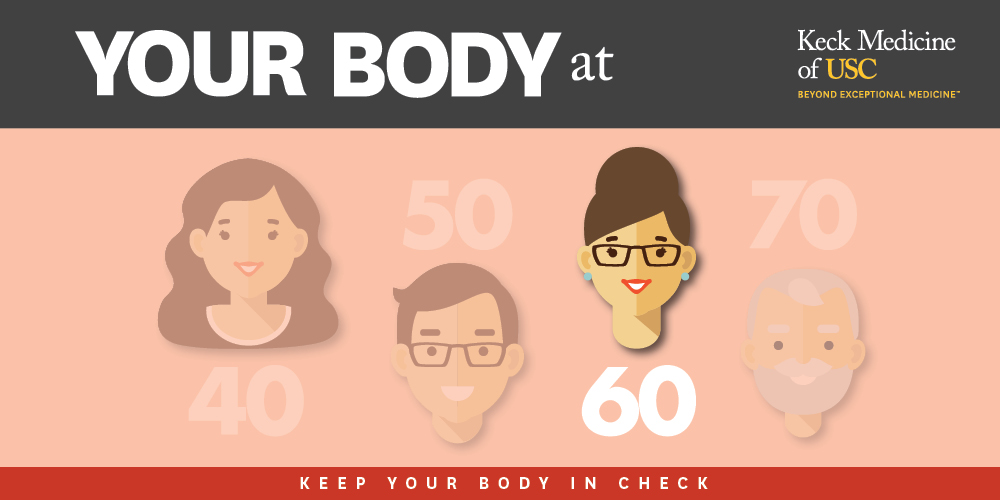
Forget images of early bird specials, grannies and rocking chairs. Today’s young-at-heart 60-year-olds are embracing an active and healthy lifestyle.
As the saying goes, age is just a number. A growing body of research indicates that, indeed, a positive outlook on life can lead to improved health and longer life. An upbeat mental state can, for example, reduce the risk of heart disease, improve blood sugar levels and lower blood pressure. A positive attitude toward aging may also protect against dementia — even if you’re genetically at risk for it. The key is to have an active lifestyle, full of meaningful pursuits. Of course, you’ll also want to get the proper screenings and know what to expect, so you can proactively address any health concerns.
You may find yourself counting sheep
What to expect: People over 60 need just as much sleep as younger adults — but they often don’t get it. Insomnia is typically caused by factors like stress, depression or long work hours, but it is also linked to medical conditions such as diabetes, heart disease or pain from arthritis. Weight gain, too, can lead to sleep apnea, in which the body isn’t getting enough oxygen, causing frequent interruptions of sleep at night.
They may also experience a circadian rhythm issue called advanced sleep phase disorder (ASPD), which can cause people to get sleepy and awaken earlier than they did when they were younger.
Not getting adequate sleep can aggravate conditions already present and lead to others, including attention and memory challenges. Although sleep patterns change as we age, it is important to remember that disturbed sleep and waking up tired every day are not part of normal aging.
What can help: Adopt healthy sleep habits, such as going to bed and waking up at the same time each day — especially on weekends and holidays; putting technology away at night to avoid the blue light from electronic devices; and staying away from alcohol and caffeine within a few hours of bedtime. If you still have trouble sleeping, you may want to discuss your symptoms with a physician.

Achy joints may cramp your style
What to expect: People over 60 may experience symptoms of osteoarthritis, which generally occurs from wear and tear on the joints, as cartilage wears away and the bones start rubbing together. The condition can cause aching, stiffness and swelling.
What can help: Lifestyle modifications, including weight loss to relieve stress on the joints and strengthen the muscles that support them, are preventive as well as therapeutic. Although you might not feel like exercising, not doing so may worsen arthritis symptoms. Additionally, over-the-counter and prescription medications, alternative medical treatments and surgery are available.
Be ready for a less robust immune system
What to expect: As our immune system ages, it diminishes in function, leaving us more vulnerable to infection than we were in our youth.
“As we age, our immune system undergoes a gradual decline — there is less production of immune fighter cells; it is less prepared for a broad range of invaders; and it is less capable of preventing reactivation of latent viruses, such as chicken pox,” says Carolyn Kaloostian, MD, MPH, a family medicine physician at Keck Medicine and a clinical associate professor of family medicine at the Keck School. “The body does not robustly identify when you are sick — you might not develop a fever, for example — and it can take longer to fight an infection.”
What can help: Staying up-to-date with immunizations is critical. Kaloostian also says that getting proper nutrition is key in keeping our immune system in fighting shape.
“Though the immune system will inevitably become weaker with time, we can do our part to maintain a well-balanced diet, take a multivitamin, reduce stress and ask a physician about any medications we’re taking that may inhibit the vitamin absorption valuable for immune system function,” she says.
You’ll have to be more careful about falls
What to expect: Osteoporosis, which is characterized by weakened bones that are more likely to break, becomes more prevalent as we age. The condition is more commonly diagnosed among women, in part due to the impact of menopause. Approximately 25% of women over 65 (1 in 4) are affected by osteoporosis, but it also affects about 5% of men (1 in 20) over the age of 65.
What can help: Weight-bearing exercises improve overall bone health and prevent injuries that may be associated with osteoporosis. If you’ve already been diagnosed with low bone density, prescription medications can help. Physicians also recommend a healthy diet that includes the correct levels of vitamin D and calcium, as well as limited alcohol consumption. It also makes sense to prevent falls before they occur by keeping your home safe and uncluttered.
Topics
